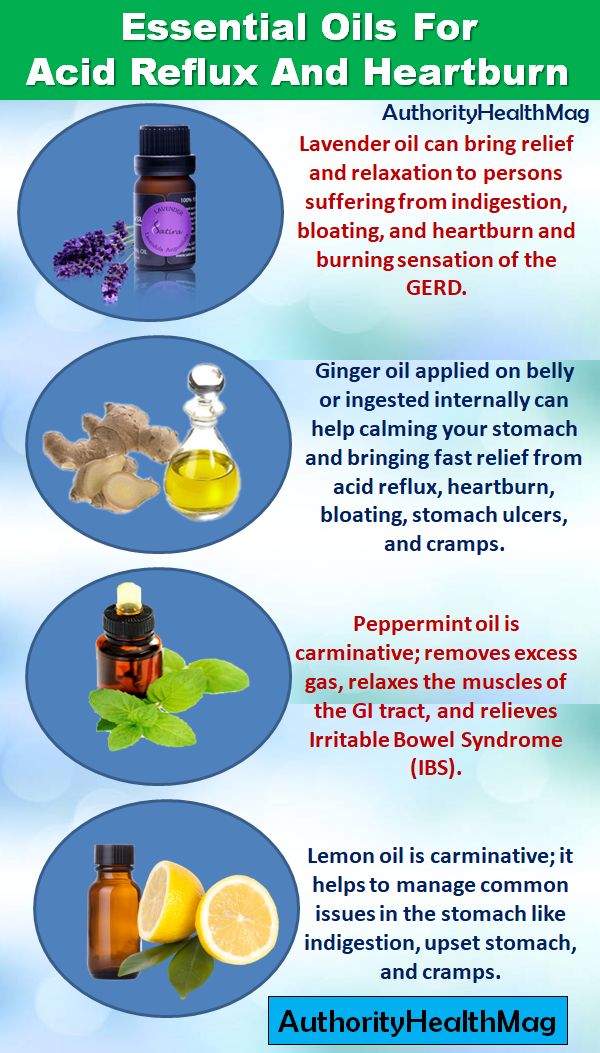An increasing number of people are discovering the immense health benefits of essential oils.
Fortunately, various essential oils are obtained from different plant sources.
They contain medicinal properties that can heal one disease or another.
A few essential oils relieve common health problems such as burping, bloating, acidity, heartburn, indigestion, and stomach pain.
In this article, you will read about the best essential oils to relieve heartburn and gastroesophageal reflux.
About Acid Reflux and Heartburn
According to a report published at WebMD, “Heartburn, also called acid indigestion, is an irritation of the esophagus caused by acid that refluxes (comes back up) from the stomach.”
A reflex action caused by acid in the stomach pushes acids and food particles into the esophagus.
It is a Gastroesophageal reflux disease, or GERD, which manifests several symptoms.
The most common symptoms of acid reflux are heartburn, difficulty swallowing, and regurgitation.
You could be suffering from heartburn if you have symptoms like:
- a sour taste at the back of the throat, or
- a feeling of food being stuck in the throat.
You may also experience some the symptoms like shortness of breath, dizziness, cold sweat, radiation to the neck or arms, dry cough, hoarseness, bad breath, and sore throat.
If you are regularly experiencing heartburn, they are most likely caused by GERD.
Do Essential Oils For Heartburn And Acid Reflux Help
Essential oils are extracted from plants such as bark, roots, flowers, and seeds.
Most of these oils contain several natural chemical properties with high medicinal value.
Essential oils have been used for various treatments throughout the centuries.
Today, aromatherapy is an established stream of natural treatments for several health conditions.
Unfortunately, research on EOs is very limited.
Evidence from some of the studies and scholarly writings suggests that using certain oils may effectively relieve the symptoms of GERD and heartburn.
The mainstream medical community does not believe EOs can help with issues like gastroesophageal reflux, heartburn, and indigestion.
The medical community limits the use of EOs to aromatherapy for stress relief and mood enhancement.
However, experts in traditional medicines and naturopaths vouch for the effectiveness of some of the EOs in getting rid of gastroesophageal reflux disease.
Here are the facts you need to know about using essential oils for heartburn relief.
4 Essential Oils For Acid Reflux and Heartburn
Aromatherapy is a popular natural solution for overcoming GERD and other digestive problems.
A few EOs work extremely well for treating the symptoms of GERD.
We have chosen 4 essentials that have proven benefits in getting rid of heartburn and gastroesophageal reflux.
1. Lemon oil
Lemon essential oil can produce an alkaline effect that helps reduce and balance acidity in your stomach.
Lemon oil contains properties that can naturally detox and cleanse the digestive system.
Drinking a cup of water with a drop of diluted lemon oil can help flush out toxins and excess acid in your digestive system.
The antibacterial properties in the lemon oil help to eliminate harmful bacteria that may cause infection and digestive issues.
Lemon oil is carminative; it helps manage common stomach issues like indigestion, upset stomach, and cramps.
How to use:
It is safe to consume one or two drops of lemon oil diluted in a cup of warm water.
It is best to drink lemon oil mixed with water 30 minutes before your meal and have it twice a day.
Rubbing a few drops of lemon oil on your belly and inhaling the scent of this oil can give you some relief from distress caused by acid reflux.
2. Lavender oil
Aromatherapy with lavender oil is well known for its instant calming and relaxing effects on both body and mind.
It has several medicinal properties that can treat several health conditions.
This oil is widely used for treating burns, bug bites, anxiety, insomnia, depression, indigestion, restlessness, and digestive issues.
This oil can relieve and relax people suffering from indigestion, bloating, heartburn, and the burning sensation associated with GERD.
You might experience insomnia if you have nighttime heartburn. Using this oil can calm down the distress caused by heartburn and give you a good night’s sleep.
How to use:
Apply 3 drops of lavender oil to your belly by gently massaging it with the palm of your hand.
Another method is to dilute 2 drops of oil in a cup of warm water and drink it 30 minutes before the meal.
You can also use aromatherapy with it to calm the distress caused by GER.
Spraying a few drops of this oil on your pillow can induce proper sleep and rest.
3. Ginger oil
Ginger essential oil is an effective home remedy for dealing with issues affecting the respiratory and digestive systems.
Ginger oil is a folklore medicine for treating health issues like nausea, indigestion, respiratory conditions, throat infections, upset stomachs, menstrual disorders, and inflammation.
This oil helps manage various gastrointestinal problems, including acidic ulcers and heartburn.
Ginger oil applied to the belly or ingested internally aids in calming your stomach and bringing fast relief from GER, heartburn, bloating stomach ulcers, and cramps.
How to use:
Add 3 drops of ginger oil to a cup of warm herbal tea and drink it 30 minutes before the meal.
If you have bloat in the stomach, you can gently rub a few drops of ginger oil on your belly.
Inhaling the aroma of ginger oil helps to quell nausea and heartburn.
Adding a few drops of ginger oil to warm bath water can help reduce nausea and burping caused by acidic reactions.
4. Peppermint oil
Peppermint essential oil is very helpful for digestion and healing an upset stomach.
It is carminative and therefore helps in removing excess gas.
Some research reports have indicated the proven effects of this oil in relieving heartburn when combined with caraway oil.
This oil helps in relaxing the smooth muscles of the GI tract.
A few studies have also shown the effectiveness of the oil in relieving Irritable Bowel Syndrome (IBS), which may cause stomach pain and GER.
This oil, used in the right dosage, can soothe digestive distress and indigestion.
However, ingesting an overdose of the oil can cause counterproductive results by aggravating heartburn and bloating.
Infesting 1 or 2 drops of oil can relieve reflux, heartburn, stomach cramps, bloating, and nausea.
How to use:
Add 2 drops each of peppermint oil and caraway oil to a cup of herbal tea and drink it slowly 30 minutes before your meal.
Add ½ teaspoon of apple cider vinegar, 1 teaspoon of Manuka honey, and a drop of peppermint oil to a cup of warm water. This refreshing drink can boost your digestive system and remove digestive disorders.
To get quick relief from bloating and gastroesophageal reflux, you can rub a few drops of peppermint oil on your belly.
Do not ingest more than 2 drops of peppermint oil at a time.
Side Effects And Warnings
Any scientific studies do not back the use of essential oils for acid reflux and heartburn.
Essential oils might help alleviate some of the symptoms of heartburn but may not assist in rooting out its cause.
Use essential oils only under the guidance of a well-trained aromatherapist or physician.
Consuming EOs internally is rarely recommended. They should never be ingested in excess dosage or without diluting.
Incorrect usage of EOs can cause counterproductive results.
Before topical application, dilute the essential oil with a carrier oil.
Use only the therapeutic-quality EOs sold by reputed companies known for quality products.
Aromatherapy is the safest way to use essential oils for treatment purposes.
After ingesting EOs, you must consult a physician if you experience unusual physical reactions like nausea, vomiting, a lingering burning sensation, or an upset stomach.
Should you try essential oils for treating acid reflux?
Before you try essential oils to treat heartburn or any other condition, you must study the oils, their risks, and their side effects.
The U.S. Food and Drug Administration (FDA) classifies essential oils as “generally recognized as safe.”
The FDA does not closely monitor and test the quality of all EOs sold in stores and online retailers.
After identifying the right essential oils for managing heartburn, you must choose the best oil from reputed producers and sellers.
If you are buying from online retailers, look for genuine customer reviews and feedback on the product.
Essential oils are unverified home remedies for heartburn. Your doctor may not know much about using EOs to treat acid reflux.
You must check up on informative resources on EOs and identify the possible choice of oils for treating reflux issues.
Test the oils in small quantities before you start using them regularly. Some of the oils may have quick side effects on your health, like allergic reactions or upset stomachs.
When should I consult a doctor?
OTC medicines and natural remedies like essential oils are not meant for people suffering from frequent heartburn problems for a long period of time.
After utilizing essential oils or OTC treatments for 2 days, if they do not reduce the symptoms of heartburn, then you must discuss the treatment option with your doctor.

Other Effective Treatments For Heartburn
Prescription medicines recommended by your doctor are the best treatment for heartburn.
However, mild and occasional heartburn can be treated with over-the-counter (OTC) medications.
If you have severe and frequent heartburn, you must choose the best treatment options under the guidance of your doctor.
Here are some of the most common medications for heartburn and reflux:
H2 receptor antagonists (H2RAs)
H2RAs are an effective treatment option for heartburn that can very well remove its symptoms.
H2RA medicines, under different product names like Famotidine, Cimetidine, Nizatidine, and Ranitidine, are sold in pharmacies as OTC or prescription medications.
H2RAs help in reducing the stomach acid you have.
According to your doctor’s advice, you might need to take an H2RA medication for longer to get full relief from heartburn.
Antacids
OTC antacids are the most popular treatment for heartburn.
It is also used to eliminate the symptoms of extra gas, such as bloating, belching, pressure, and pain in the stomach.
Simethicone in antacids helps break up gas bubbles in the gut.
Magnesium and aluminum antacids work quickly to lower the acid in the stomach.
Antacids give quick relief from the symptoms of heartburn.
However, an antacid may not work for severe and recurring heartburn issues, and you must use prescription-strength medicines.
Proton pump inhibitors (PPIs)
Proton-pump inhibitors (PPIs) are a group of drugs that help reduce gastric acid production.
They have commonly used acid secretion inhibitors.
PPIs effectively reduce the amount of stomach acid made by the glands in your stomach.
Reckless PPIs can cause side effects like headache, diarrhea, constipation, abdominal pain, flatulence, fever, vomiting, or nausea.
If your doctor advises it, take PPI medications as prescription medications.
